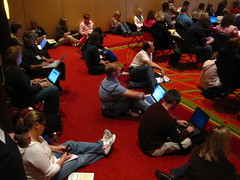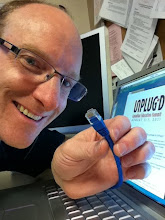 Admittedly, not much changed in schools in 2009. We still have classrooms that look and function very much like they have for the past 100 or more years. But 2009, did in fact seem to me to be a year where more educators participated in discussions about the need for change.
Admittedly, not much changed in schools in 2009. We still have classrooms that look and function very much like they have for the past 100 or more years. But 2009, did in fact seem to me to be a year where more educators participated in discussions about the need for change.I suspect that many edubloggers can relate to Will Richardson's admission in What's Changed?, that he's done less blogging and more tweeting in the past 12 months. Though microblogging may be shallow, it has proven to be very accessible to educators, with Twitter being leveraged on both mobile devices, and school computers.
As a tool, Twitter is a double-edged sword: The depth of thought I used to see in the rich blog posts of change agents, has instead become a sequence of tweets, each distilled to no more than 140 characters; but many more educators have joined in the conversation.
In the first half of 2009, Twitter for Teachers was introduced as a resource wiki for educators. With over 500 registered users, it's still a great place to introduce others to microblogging. We also succeeded in bringing synchronous discussion to educators on Twitter via 'Educhat'. We've since passed the torch to 'edchat' which has proven to be a collegial way to welcome new teachers to Twitter.
 In the coming year, I'll be looking for more opportunities to meet face to face with fellow Twitterers. If you have any doubt that the relationships we're building are authentic, join in a conference experience like Educon 2.2, or arrange a tweet-up of regional peers. Even if you can't be there in person, participation at such events can be transformative.
In the coming year, I'll be looking for more opportunities to meet face to face with fellow Twitterers. If you have any doubt that the relationships we're building are authentic, join in a conference experience like Educon 2.2, or arrange a tweet-up of regional peers. Even if you can't be there in person, participation at such events can be transformative.As a vehicle for change agents, Twitter offers a great way to connect many disparate voices. In 2010, here's hoping we can engage many more teacher-learners in the conversation.
Image Credit: left-hand













